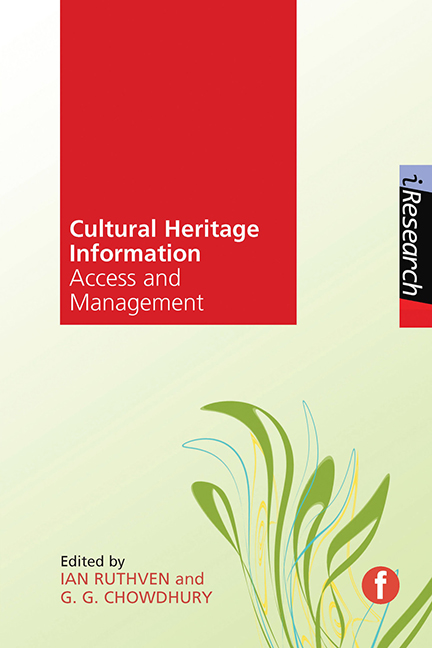Book contents
- Frontmatter
- Contents
- List of figures and tables
- Contributors
- Preface
- 1 Managing digital cultural heritage information
- 2 Digital humanities and digital cultural heritage (alt-history and future directions)
- 3 Management of cultural heritage information: policies and practices
- 4 Cultural heritage information: artefacts and digitization technologies
- 5 Metadata in cultural contexts – from manga to digital archives in a linked open data environment
- 6 Managing cultural heritage: information systems architecture
- 7 Cultural heritage information: users and usability
- 8 A framework for classifying and comparing interactions in culturalheritage information systems
- 9 Semantic access and exploration in cultural heritage digital libraries
- 10 Supporting exploration and use of digital cultural heritage materials: the PATHS perspective
- 11 Cultural heritage information services: sustainability issues
- Index
7 - Cultural heritage information: users and usability
Published online by Cambridge University Press: 10 September 2022
- Frontmatter
- Contents
- List of figures and tables
- Contributors
- Preface
- 1 Managing digital cultural heritage information
- 2 Digital humanities and digital cultural heritage (alt-history and future directions)
- 3 Management of cultural heritage information: policies and practices
- 4 Cultural heritage information: artefacts and digitization technologies
- 5 Metadata in cultural contexts – from manga to digital archives in a linked open data environment
- 6 Managing cultural heritage: information systems architecture
- 7 Cultural heritage information: users and usability
- 8 A framework for classifying and comparing interactions in culturalheritage information systems
- 9 Semantic access and exploration in cultural heritage digital libraries
- 10 Supporting exploration and use of digital cultural heritage materials: the PATHS perspective
- 11 Cultural heritage information services: sustainability issues
- Index
Summary
Introduction
The main goal of an information system or service is to facilitate discovery and access to relevant information, thereby meeting the requirements of users. User studies or human information behaviour studies, which focus broadly on how people seek and use information, have remained a major focus of the research and professional activities in information science over the past six decades. Initial research focusing on information needs and information behaviour began in the 1950s with users in science and technology disciplines (Wilson, 1999, 2008); it continued through the 1960s and grew significantly in the 1970s onwards. The field of research has been designated or referred to by various names, such as information behaviour studies, user studies, information needs studies, information seeking and retrieval studies, and so on (Bawden and Robinson, 2012). Several theories and models have been developed in course of the research activities during the past few decades (for details see Wilson, 1994). However, during the first few decades, the focus of user studies remained limited to the information systems and users in the STEM (science, technology, engineering and medicine), and in some cases social sciences, disciplines, and ‘only during the 1990s did attention turn to the information behaviours of academics and practitioners in the arts and humanities’ (Bawden and Robinson, 2012, 191).
In today's digital world users can play a key role in the entire lifecycle of information – from the creation of information to the design and usability of information systems and services that facilitate access to, and use of, information. While user studies focus on information behaviour, information needs, information seeking and retrieval, etc., usability studies focus on the role of users in the design and evaluation of information systems, products and services (Chowdhury and Chowdhury, 2011). The overall aim of both these sets of studies is to facilitate better and easier access to information that are relevant to a user in a specific context.
With the advancement of ICT, web and mobile technologies the scope of user and usability studies has increased significantly because:
• An information service may include one or more specific types or format of information – text as well as images of objects and artefacts, data, music, video, etc.
- Type
- Chapter
- Information
- Cultural Heritage InformationAccess and Management, pp. 135 - 152Publisher: FacetPrint publication year: 2015
- 3
- Cited by



